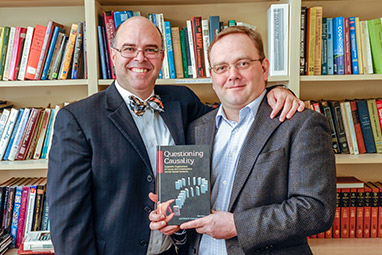The psychology and philosophy of sugar pills
Professors combine disciplines to publish on the placebo effect
Dr. John Lefebvre, left, and Dr. James Bednar co-authored a chapter in the book "Questioning Causality: Scientific Explorations of Cause and Consequence across Social Contexts," published in January 2016.
2016-04-04
SPARTANBURG, S.C. – Is the “placebo effect” in your mind or your body? It’s a question that gave two Wofford College professors – Dr. John Lefebvre, professor and chair in the Department of Psychology, and Dr. James Bednar, assistant professor of philosophy – the opportunity to combine disciplines to study together. In January 2016, they co-authored a chapter on the topic.Their chapter, “Causes and Consequences: Pain Research and the Placebo Effect,” was published in “Questioning Causality: Scientific Explorations of Cause and Consequence across Social Contexts,” edited by Harré and Moghaddam.“It’s the classic sugar pill example. Your body responds ‘as if’ something were happening to it,” says Lefebvre. “For a long time, people assumed that when taking a sugar pill, you just convinced yourself that you were taking a medicine that was going to help you, and somehow you got better. The research now shows that, no, the placebo effect actually creates in the body a reaction similar to what would happen if you had taken the actual medication. This brings up the idea of cause and causality. If you say you have pain relief, is it the medication that is causing the pain relief, or is it you?”As a philosopher that specializes in the philosophy of David Hume, Bednar says he likes to think about the difference between mind and body. “Most people nowadays are materialists in some form – the mind is the brain – and think about things happening in your body as having some sort of impact on your mind. But the placebo effect appears as a belief you acquire," he says. "This belief … affects the pain you feel in your knee. This is very interesting to a materialist.”According to Lefebvre, the biggest challenge in writing the chapter was unifying two very different voices. Bednar’s work usually involves creating an argument and sustaining it while considering objections. Lefebvre says he works primarily in empirical studies: “If there’s an objection to my argument, I’d request another study.” The challenge and the opportunity to collaborate across disciplines is one of the reasons that Bednar and Lefebvre enjoy teaching, writing, doing research and mentoring students at Wofford College.“The departments are constantly interacting with each other,” says Bednar. “My first year at Wofford, there was a program that allowed some of the faculty to travel to China together. Ultimately, this research wouldn’t have happened without that opportunity for us to get to know each other on that trip. That was fantastic, especially for a new person. I was able to make friends across departments, and now when I do work outside philosophy, I’m interacting with them quite a bit.”Lefebvre says that this interdisciplinary partnership adds richness to the chapter. “The concept of the chapter itself is interesting, both from a scientific and philosophical perspective, but what’s even more interesting is that it was written by someone in the natural sciences and by someone in the humanities. That reflects the ethos here at Wofford,” he says. “You’ve got two individuals, who, because we’re at a liberal arts college, know each other personally. We know each other’s work and admire each other ... and we can work together and actually have it published. That’s unusual.”By Sarah Madden, Wofford Class of 2017